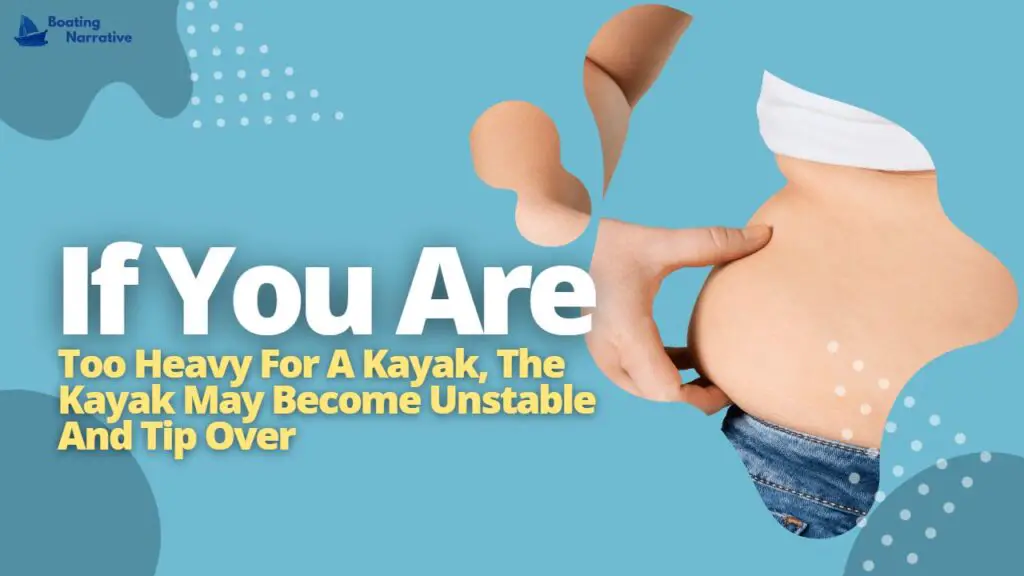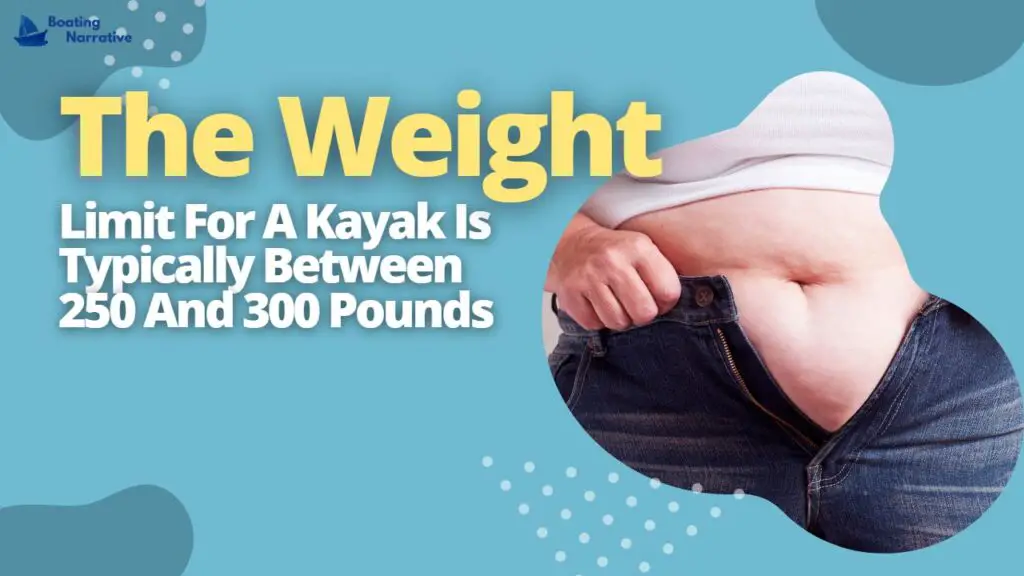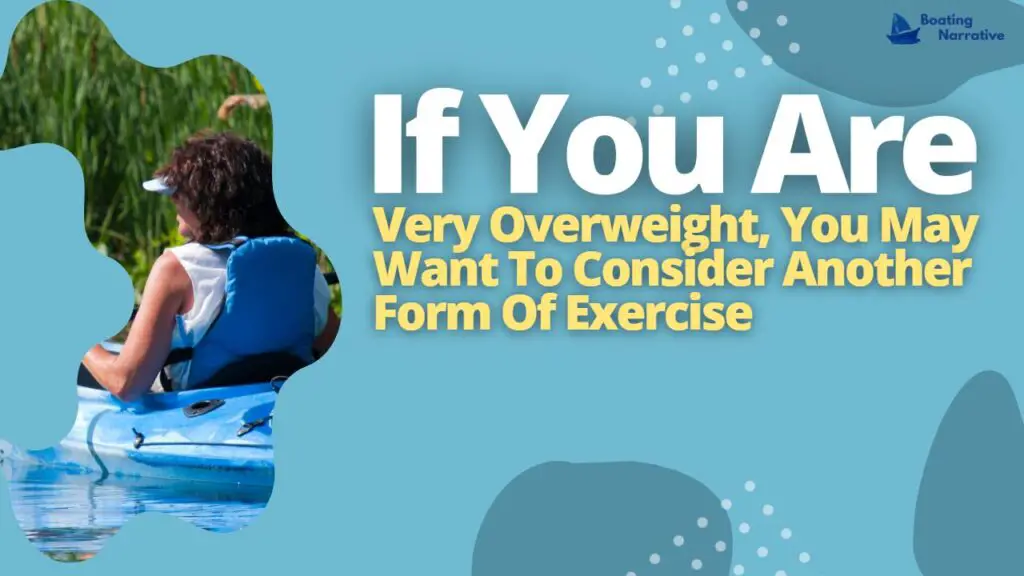If you are too heavy for a kayak, the kayak will sit lower in the water and will be less stable. You may also have difficulty paddling and steering the kayak.
If you’re thinking about going kayaking but are worried about your weight, read on to find out what could happen.
Key Takeaway’s
- If you are too heavy for a kayak, it may sink or tip over.
- You may also have difficulty paddling and steering the kayak.
- It is important to choose a kayak that is the right size and weight limit for you.
- You can test if a kayak is too small by observing if your knees are bent at a 90-degree angle.
- You can test if a kayak is too big by lifting it over your head.

Here’s The Answer To What Happens If You Are Too Heavy For A Kayak
If you’re too heavy for a kayak, you may sink it or capsize it. If you sink the kayak, you’ll have to swim to shore.
If you capsize the kayak, you’ll have to make it right and get back in. Either way, it knows how to swim is important before you go kayaking.
A few things can happen if you’re too heavy for a kayak. First, you may sink the kayak. Second, you may capsize the kayak.
Third, you may not be able to paddle as efficiently. And fourth, your center of gravity will be off, which could make it difficult to control the kayak.
If You Are Too Heavy For A Kayak, The Kayak May Become Unstable And Tip Over

If you are too heavy for your kayak, it won’t be able to handle the weight. If unsure of your kayak’s capacity, check its specifications to see what it can hold.
As a general guideline, if you weigh more than 250 pounds and have not been paddling for at least six months, consider renting or borrowing a lighter boat from a friend who has one.
If You Are Too Heavy For A Kayak, The Kayak May Become Unstable And Tip Over
You May Also Have Difficulty Paddling And Steering The Kayak
While you may want to take on the challenge of paddling a kayak that is too heavy, it’s best not to. While kayaking can be fun and rewarding,
if you feel like it’s becoming a struggle due to your weight and/or age, then it may be time to consider purchasing a different model.
Here are some reasons why:
- You May Also Have Difficulty Paddling And Steering The Kayak. If your kayak is too heavy, it will be more difficult for you to paddle and steer the vessel.
- You can use one hand while holding onto something else to keep the kayak steady while paddling.
- You can use both hands while holding onto something else, so you don’t capsize.
The Weight Limit For A Kayak Is Typically Between 250 And 300 Pounds

When you hear “weight limit,” what do you think? Probably the maximum weight that the kayak can handle. If a kayak can hold 250 pounds, it probably means that if the person in question weighs more than 250 pounds, they should not use that kayak.
However, this is not quite right. The maximum weight capacity (the limit) is less than or equal to the actual weight of the boat plus its occupants (e.g., if your boat weighs 75 pounds and two people weigh 150 pounds each, then your total weight capacity will be 300 pounds).
This means that if your kayak weighs 60 pounds and you weigh 100 pounds yourself, then only 40 additional pounds can be added to this total without exceeding its safe limits.
If You Are Over The Weight Limit, You May Want To Consider Renting A Tandem Kayak
Renting a tandem kayak is a good alternative to owning your own. Tandem kayaks are built to carry more weight than traditional kayaks, which means that you can go out on the water with up to two other people without worrying about breaking your boat or putting yourself in danger.
Renting a tandem kayak is also a good way to try out paddling before committing to buying one for yourself.
It’s easy enough for beginners and challenging enough for experienced paddlers.
If You Are Very Overweight, You May Want To Consider Another Form Of Exercise

If you are overweight, you may want to consider another form of exercise, such as swimming or hiking.
One great way to lose weight is by going swimming. Swimming is a low-impact activity that almost everyone can enjoy.
With the right gear and accessories, it’s also a great option for those with mobility issues who might not be able to do other types of exercise, such as running or weight lifting.
Another good option is hiking! Hiking can be fun and provides an opportunity for some fresh air simultaneously.
You’ll get plenty of exercises while enjoying the sights of nature at its finest! This activity requires no special equipment except for comfortable shoes (and maybe bug spray, depending on where you live).
What Are The Consequences Of Capsizing A Kayak?
If you’re not careful, it could be dangerous. You may get hurt, or even worse: hypothermic and/or drowning.
You must know what to do if your kayak flips over.
Luckily, we’ve put together this handy guide with all the steps you need to take to avoid getting stuck in a dangerous situation.
How Can You Avoid Being Too Heavy For A Kayak?

If you’re unsure whether your kayak is the right size, there are some pretty simple ways to determine if it’s a good fit.
Your weight will be one of the biggest factors in determining whether or not you’re too heavy for a particular kayak.
If this is an issue for you, try looking into getting an inflatable kayak that can handle more than one person and add extra flotation devices to keep you afloat.
What if none of those options work? How can we avoid being too heavy for our kayaks? Below are five tips that should help keep things under control:
- Don’t overload your boat: This tip may seem obvious, but some people don’t realize how much weight their boat is designed to carry until it’s too late. If possible, take photos and measurements before purchasing so that when buying new gear later down the road (like an extra paddle), it won’t exceed maximum capacity limits set by manufacturers like Dagger Kayaks (upgrades available here).
What Are Some Tips For Staying Safe While Kayaking?
- Wear a life jacket.
- Bring a first aid kit and a waterproof bag to store your valuables.
- Bring a whistle, a survival kit, and a map of your kayaking area.
In Short
The blog post discusses what could happen if someone is too heavy for a kayak and how to avoid such a situation.
It is important to know your weight limit when choosing a kayak and to not exceed that limit, as it could lead to dangerous consequences.

